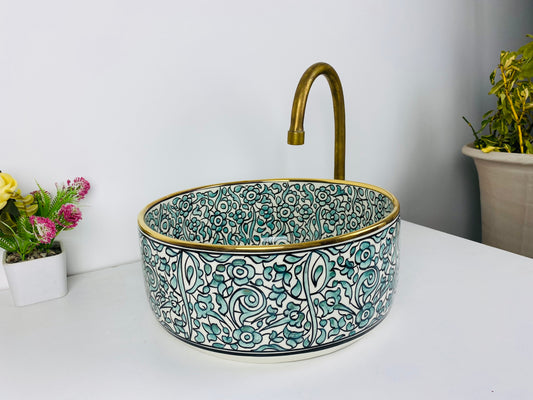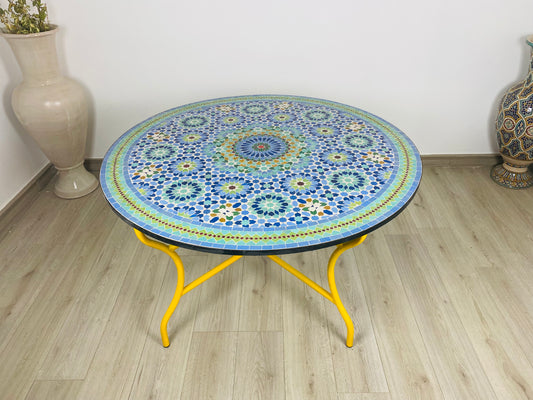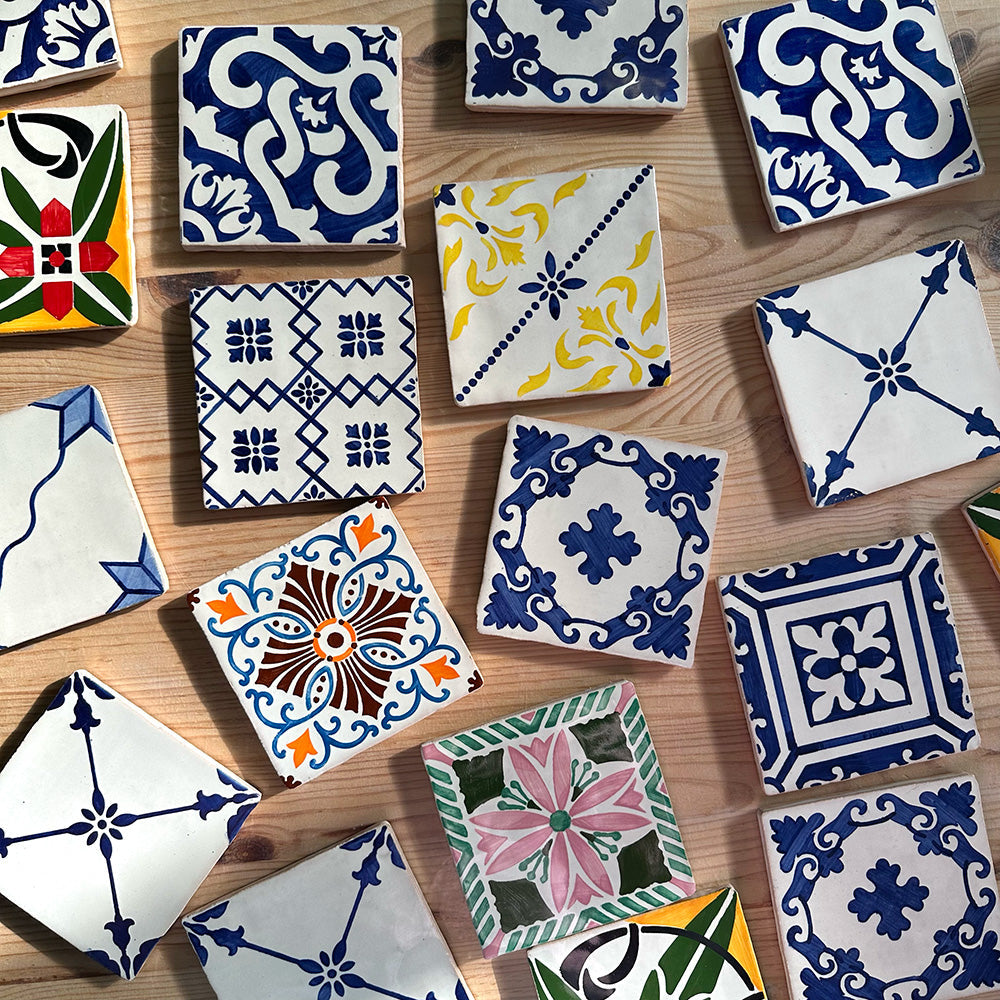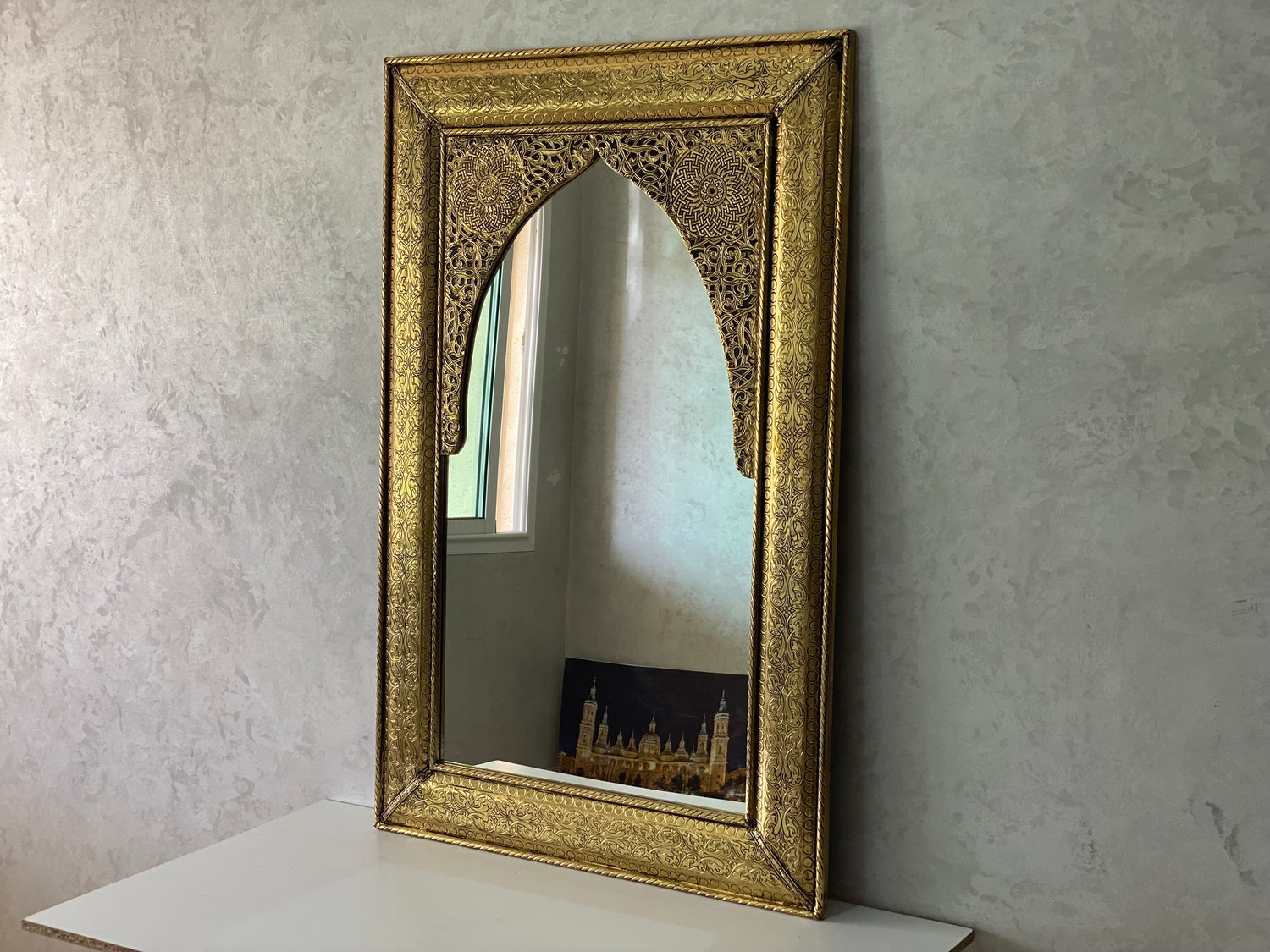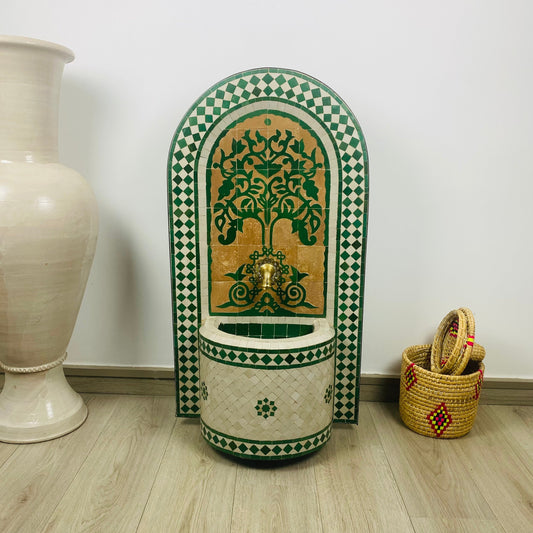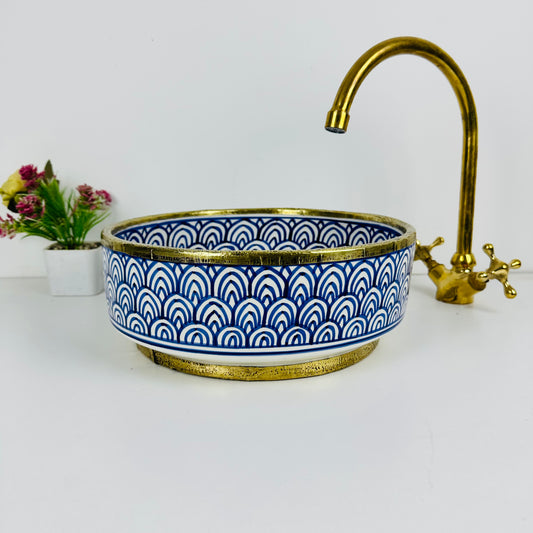Featured Product
-
Handmade Unlacquered Brass Bridge Faucet with Side Sprayer – Luxury Kitchen or Bathroom Tap
Regular price From $408.38 USDRegular priceUnit price per -
Casablanca Bloom Ceramic Vessel sink with Cold rim
Regular price From $100.80 USDRegular priceUnit price per -
Royal Moroccan Zellige Fountain – Sky Blue & Gold Accents
Regular price From $1,255.80 USDRegular priceUnit price per -
Handmade Moroccan Zellige Mosaic Table – Ocean-Inspired Beauty
Regular price From $806.40 USDRegular priceUnit price per
Collections
Mosaic tiles, ceramic and brass
Enter the enchanting realm of mosaic tiles, ceramic, and brass—a world where artistry and craftsmanship converge. Mosaic tiles create intricate patterns, ceramic embodies versatility, and brass adds a touch of elegance. Together, they tell stories, adorn spaces, and evoke a timeless allure. Explore this captivating world and experience the transformative power of these remarkable mediums.
Our looks
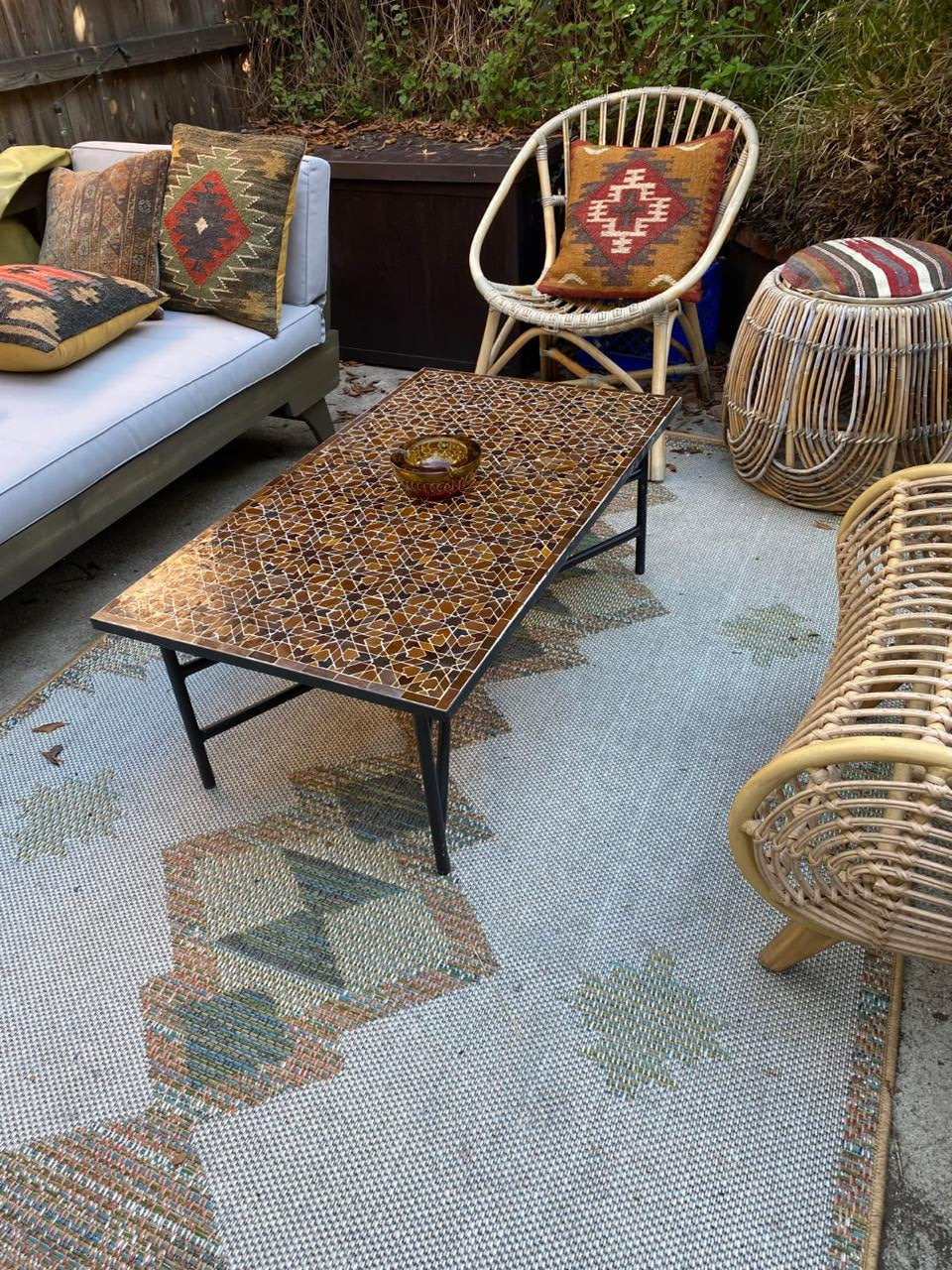
Zellige Fountain – Timeless Elegance in Green & Gold
Regular price
From $2,419.20 USD
Regular price
Sale price
From $2,419.20 USD
Unit price
per
Azure Waters: Handcrafted Ceramic Sink in Azure Blue Shade
Regular price
From $100.80 USD
Regular price
Sale price
From $100.80 USD
Unit price
per
What our customers say
Care Instructions
SINKS
- Regular Cleaning: Clean the ceramic sink regularly using a soft, non-abrasive sponge or cloth and a mild, non-abrasive cleanser. Rinse the sink thoroughly with clean water and dry it with a soft towel to prevent water spots or mineral deposits.
- Avoid Harsh Cleaners: Avoid using harsh or abrasive cleaners, bleach, ammonia, or acidic substances on the ceramic sink, as they can damage the finish and potentially cause discoloration. Stick to gentle, non-abrasive cleaning solutions specifically formulated for ceramic surfaces.
- Prevent Staining: Wipe away spills and splashes promptly to prevent staining. Certain substances like coffee, tea, red wine, and acidic foods can potentially stain the ceramic sink if left for an extended period. Clean these spills using mild soap and water as soon as possible.
- Avoid Scratching: Take care to prevent scratching the ceramic sink's surface. Avoid using rough cleaning pads or abrasive materials. Similarly, avoid using sharp or abrasive objects directly on the sink's surface.
- Prevent Impact: Ceramic sinks are sturdy but can be susceptible to chipping or cracking from heavy impact. Avoid dropping heavy objects onto the sink's surface and handle items with care.
- Avoid Extreme Temperatures: Ceramic sinks can withstand normal temperature variations, but extreme heat or sudden temperature changes can potentially cause damage. Avoid pouring boiling water directly into the sink or placing hot cookware directly on the surface.
- Avoid Mineral Buildup: If you live in an area with hard water, mineral deposits can accumulate on the ceramic sink's surface over time. To prevent this, wipe the sink dry after each use to minimize water spots and mineral buildup. Regularly clean the sink with a solution of equal parts water and vinegar to remove mineral deposits.
- Inspect for Damage: Periodically inspect the ceramic sink for any signs of damage, such as chips, cracks, or discoloration. If you notice any issues, consult a professional for repair or replacement options.
FOUNTAINS
- Regular Cleaning: Clean the ceramic fountain regularly to keep it free from dirt, algae, and debris. Use a soft brush or sponge and a mild, non-abrasive cleanser specifically formulated for ceramic surfaces. Gently scrub the fountain's surface, including the basin and any decorative elements, to remove any buildup. Rinse thoroughly with clean water.
- Avoid Harsh Chemicals: Avoid using harsh chemicals, bleach, ammonia, or abrasive cleaners on the ceramic fountain, as they can damage the finish and potentially harm the pump or components. Stick to gentle, non-abrasive cleaning solutions or natural cleaners suitable for ceramic surfaces.
- Minimize Algae Growth: To prevent algae growth in the fountain, it's important to maintain the water quality. Consider using algae control products or additives specifically designed for fountains to keep the water clean and clear.
- Clean the Pump: The pump is an essential component of a ceramic fountain. Keeping it clean ensures optimal performance and prolongs its lifespan.
- Winter Care: If you live in a region with freezing temperatures, it's crucial to protect your ceramic fountain from freezing. Before winter sets in, drain all the water from the fountain and disassemble any removable parts, such as the pump. Store these parts indoors in a dry and protected area. Cover the fountain or move it indoors to prevent potential cracking or damage from freezing temperatures.
- Inspect for Damage: Regularly inspect the ceramic fountain for any signs of damage, such as cracks, chips, or loose pieces. If you notice any issues, address them promptly to prevent further damage. Consult a professional if significant repairs or replacements are necessary.
- Placement Considerations: When placing the ceramic fountain, consider the surroundings. Avoid direct exposure to harsh sunlight, as it can fade the colors of the ceramic over time. Additionally, position the fountain away from strong winds or areas prone to debris accumulation to maintain its cleanliness and prevent damage.
TILES
- Regular Cleaning: Clean the ceramic tiles regularly using a soft, non-abrasive cloth or mop. You can use a mild, pH-neutral cleanser mixed with water to remove dirt and grime. Avoid using harsh chemicals or abrasive cleaners that can damage the tiles' surface or grout lines.
- Prevent Staining: Wipe up spills promptly to prevent staining. Certain substances like acidic liquids, oil-based products, or colored dyes can potentially stain the ceramic tiles if left for an extended period. Clean spills using a mild cleanser and water, and rinse thoroughly.
- Grout Maintenance: If your ceramic tiles have grout lines, it's important to keep them clean and well-maintained. Regularly inspect the grout for any signs of dirt, mold, or discoloration. Clean the grout periodically using a grout cleaner or a mixture of baking soda and water. Consider applying a grout sealer to protect against staining and make cleaning easier.
- Avoid Scratching: Take care to prevent scratching the ceramic tiles' surface. Avoid using abrasive materials or rough cleaning tools that can scratch or damage the tiles. Opt for soft cloths, non-abrasive sponges, or gentle cleaning brushes.
- Avoid Harsh Chemicals: Avoid using harsh chemicals, bleach, ammonia, or acidic cleaners on the ceramic tiles, as they can dull the finish or cause discoloration. Stick to mild, non-abrasive cleaners specifically formulated for ceramic surfaces.
- Prevent Impact: Although ceramic tiles are durable, they can still be prone to chipping or cracking from heavy impact. Avoid dropping heavy objects onto the tiles or dragging furniture across the floor without protective pads. Take precautions to prevent impact damage.
- Avoid Extreme Temperatures: Ceramic tiles are resistant to temperature changes, but it's best to avoid exposing them to extreme heat or cold. Use caution with hot cookware or appliances placed directly on the tiles, as sudden temperature changes can cause thermal shock. Use trivets or heat-resistant mats to protect the tiles from excessive heat.
- Regular Inspections: Periodically inspect the ceramic tiles for any signs of damage, cracks, or loose tiles. If you notice any issues, consult a professional tile installer or repair specialist for guidance on how to address the problem.




